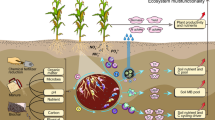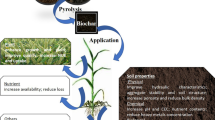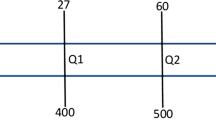Abstract
Methane (CH4) is a major greenhouse gas emitted by the industry, agriculture and natural processes such as degradation of organic matter in anaerobic waters and soils. Addition of biochars to soils has been investigated to control greenhouse gas emission, but actually there are still current conflicting views: do biochars promote or suppress greenhouse gas emissions? In particular, the role of acetate, a product of organic matter degradation and substrate of methanogenesis, is poorly known. Here, we studied the effect of acetate concentrations on CH4 production by soils amended with biochar. Results show that biochar decreased CH4 release at low acetate concentration, below 0.2 mM. Gompertz modeling reveals that CH4 production rate can be reduced by up to 26.2% by biochar application. In apparent conflict, results show also that biochar stimulated methanogenesis at higher acetate concentrations, above 2 mM. Moreover, the application of CH3F, an inhibitor of acetoclastic methanogenesis, demonstrated that biochar mildly strengthened acetoclastic methanogenesis, thus confirming that biochar favors methane production. 13C isotope analysis demonstrated that CH4 is derived from direct acetate cleavage when the methanogenic substrate, e.g., acetate, was relatively abundant. Data from 16S rRNA sequencing suggest that CH4 is produced by the metabolism of Methanosarcinaceae. This work provides extra perspective that promotion or suppression of CH4 release by biochar may depend on acetate concentration in terrestrial methanogenic environments.



Similar content being viewed by others
References
Canfield D, Kristensen E, Thamdrup B (2005) Aquatic geomicrobiology. Elsevier, San Digeo
Conrad R (2005) Quantification of methanogenic pathways using stable carbon isotopic signatures: a review and a proposal. Org Geochem 36:739–752
Conrad R, Chan OC, Claus P, Casper P (2007) Characterization of methanogenic Archaea and stable isotope fractionation during methane production in the profundal sediment of an oligotrophic lake (Lake Stechlin, Germany). Limnol Oceanogr 52:1393–1406
Holmes DE, Shrestha PM, Walker DJF et al (2017) Metatranscriptomic evidence for direct interspecies electron transfer between Geobacter and Methanothrix species in methanogenic rice paddy soils. Appl Environ Microbiol 83:e00223-17
Jeffery S, Verheijen FGA, Kammann C, Abalos D (2016) Biochar effects on methane emissions from soils: a meta-analysis. Soil Biol Biochem 101:251–258
Li J, Xiao L, Zheng S et al (2018) A new insight into the strategy for methane production affected by conductive carbon cloth in wetland soil: beneficial to acetoclastic methanogenesis instead of CO2 reduction. Sci Total Environ 643:1024–1030
Martins G, Salvador AF, Pereira L, Alves MM (2018) Methane production and conductive materials: a critical review. Environ Sci Technol 52(18):10241–10253
Pérez-Rodríguez N, García-Bernet D, Domínguez JM (2018) Faster methane production after sequential extrusion and enzymatic hydrolysis of vine trimming shoots. Environ Chem Lett 16:295–299
Qu F, Yu J, Du S et al (2014) Influences of anthropogenic cultivation on C, N and P stoichiometry of reed-dominated coastal wetlands in the Yellow River Delta. Geoderma 235–236:227–232
Salvador AF, Martins G, Melle-Franco M et al (2017) Carbon nanotubes accelerate methane production in pure cultures of methanogens and in a syntrophic coculture. Environ Microbiol 19:2727–2739
Sanchez A, Artola A, Font X et al (2015) Greenhouse gas emissions from organic waste composting. Environ Chem Lett 13:223–238
Stumm W (1996) Aquatic chemistry: chemical equilibria and rates in natural waters, 3rd edn. Wiley, New York
Wei L, Xu G, Shao H et al (2013) Regulating environmental factors of nutrients release from wheat straw biochar for sustainable agriculture. CLEAN - Soil Air Water 41(7):697–701
Whiticar M (1999) Carbon and hydrogen isotope systematics of bacterial formation and oxidation of methane. Chem Geol 161:291–314
Xiao L, Xie B, Liu J, Zhang H et al (2017) Stimulation of long-term ammonium nitrogen deposition on methanogenesis by Methanocellaceae in a coastal wetland. Sci Total Environ 595:337–343
Xiao L, Liu F, Liu J et al (2018) Nano-Fe3O4 particles accelerating electromethanogenesis on an hour-long timescale in wetland soil. Environ Sci Nano 5:436–445
Xiao, L. et al. Carbon nanotubes stimulate potential electron transfer in intracellular of methanogens to trigger acetoclastic methanogenesis. Revision requested by Environmental Science & Technology
Yaghoubi P, Yargicoglu EN, Reddy KR (2014) Effects of biochar-amendment to landfill cover soil on microbial methane oxidation: initial results, Geo-Congress 2014 technical papers. Am Soc Civ Eng 2014:1849–1858
Yuan H, Ding L, Zama E et al (2018a) Biochar modulates methanogenesis through electron syntrophy of microorganisms with ethanol as a substrate. Environ Sci Technol 52:12198–12207
Yuan J, Yuan YK, Zhu YH, Cao LK (2018b) Effects of different fertilizers on methane emissions and methanogenic community structures in paddy rhizosphere soil. Sci Total Environ 627:770–781
Zhang P, Zheng S, Liu J, Liu F, Feng Y (2018) Surface properties of activated sludge-derived biochar determine the facilitating effects on Geobacter co-cultures. Water Res 142:441–451
Zhang Y, Liu F, Xu H, Xiao L (2019) Extraction of electrons by magnetite and ferrihydrite from hydrogen-producing Clostridium bifermentans by strengthening the acetate production pathway. Sci. China Technol, Sci (in press)
Acknowledgements
The authors would like to thank prof. Eric Lichtfouse for polishing title and abstract of this paper. We thank Dr. Gang Xu from Yantai Institute of Coastal Zone Research, Chinese Academy of Sciences for his gift of biochar used in this study. This research was financially supported by the NSFC (no. 41703075, 91751112 and 41573071), the Natural Science Foundation of Shandong Province (no. JQ201608 and ZR2016DQ12) and the Young Taishan Scholars Program (No. tsqn20161054).
Author information
Authors and Affiliations
Corresponding author
Additional information
Publisher's Note
Springer Nature remains neutral with regard to jurisdictional claims in published maps and institutional affiliations.
Electronic supplementary material
Below is the link to the electronic supplementary material.
Rights and permissions
About this article
Cite this article
Xiao, L., Liu, F., Xu, H. et al. Biochar promotes methane production at high acetate concentrations in anaerobic soils. Environ Chem Lett 17, 1347–1352 (2019). https://doi.org/10.1007/s10311-019-00863-3
Received:
Accepted:
Published:
Issue Date:
DOI: https://doi.org/10.1007/s10311-019-00863-3




